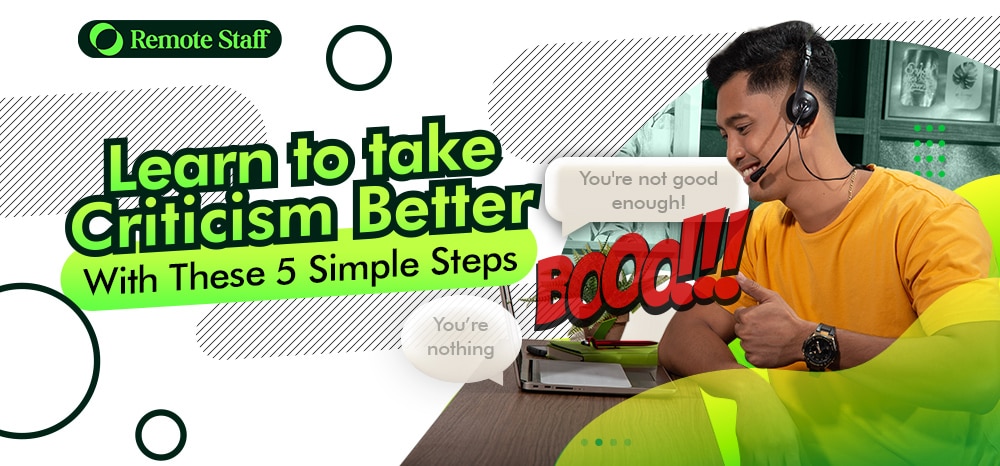Let’s be honest; nobody likes criticism. It hurts your ego and makes you anxious about the quality of your work, whether it’s a traditional or online job.
However, accepting criticism positively, especially constructive criticism, yields several benefits. One is receiving valuable feedback that can help your career grow as well as yourself.
But not all criticism is constructive. Some are insults disguised as feedback meant to pull us down or demoralize us. Others offer no valuable lesson we could use to improve ourselves.
Because of this, it can be challenging to learn how to take criticism. To help you with this, here are five simple steps for you to follow so you can learn how to take criticism.

Keep an Open Mind.
A key aspect of learning how to take criticism is keeping an open mind about it. Contrary to what you may think, nobody’s out to get you. People aren’t criticizing your work because they hate you.
On the contrary, they want to help you improve by pointing out flaws you need to work on, especially if you’re new. So remain open to their suggestions and feedback, so you’ll know what to do next time.
And remember, constructive criticism can come from anyone within the company. The feedback from a junior co-worker is just as valuable as that of your supervisor. Consciously sticking to your biases will only cause friction between you, your juniors, and your co-workers.

Think Before You Speak.
Whenever we receive criticism, our first instinct is often to speak up and defend ourselves. But before you do, pause first and think about what your critic just said to you. Was it legitimate criticism or an aggressive remark masked as feedback thrown at you?
Pausing helps you remain calm and understand why your critic said what they said about your work. Doing this helps you better defend yourself against their criticism and avoid saying something you might regret. As well as help you better control your emotions and facial expressions; so you don’t appear offended to your critic.

Listen Well to What Critics Have to Say.
After calming yourself down, you can now focus on hearing your critic’s reasoning/s behind their criticism. Listening to your critics enables you to see your work from their perspective. And how they think you could improve by removing or adding detail, information, or items from it.
One way to show you’re listening is to wait for your critics to finish what they’re saying before speaking. Besides being a common courtesy, doing so also helps you focus on what they’re saying instead of finding ways to defend yourself and your work.
If their criticism isn’t clear to you, don’t hesitate to ask them to repeat themselves. Maybe they’re just as nervous as you are, so doing this helps prevent miscommunication issues from happening.

Acknowledge the Criticism and Ask Questions in Turn.
Whether the criticism you received was severe or not, you should always thank your critics for their input. Doing this shows there’s no ill will between you two and that you appreciate their thoughts regarding your work. After all, your goal here is learning from criticism.
Afterwards, now’s your turn to respond and defend yourself from the criticism you received. One way to achieve this is to ask your critics to expound on their comments to better understand their perspectives.

If Necessary, Ask for a Follow-up Later.
If an appropriate solution isn’t found during your meeting with your critic, it would be wise to reconnect with them at a later date. Following up later gives you time to consider their recommendations and come up with solutions of your own to be presented to them later. But if all problems have been resolved, you can use this opportunity to thank them again.

Growing From One’s Mistakes.
We all make mistakes from time to time. And a crucial part of improving oneself is learning how to take criticism. Aside from showing humility, it also displays your willingness to grow and improve yourself.
If you’re ready to face criticism and grow your career, head to Remote Staff and see our list of available positions. Who knows? Maybe you’ll find your perfect job among these openings. Good Luck!

